Friday, March 28, 2014
tcpdump:: how to
tcpdump -i tap24 -lnXXvs0 udp port 15001
tcpdump -r /tmp/cpub -lnXXvs0 udp port 6003|less
tcpdump -i eth1 -lnXXvs0 vlan 1169 -w /tmp/12345
tcpdump -lnvs0 vlan 1169 -r /tmp/12345|less
tcpdump -lnvXvs0 vlan 1169 -r /tmp/12345|less
tcpdump -r /tmp/1234 -lnXXvs0|strings
/550 to search 550
/usr/sbin/tcpdump -r /tmp/zzzz -ln
/usr/sbin/tcpdump -r /tmp/zzzz -ln|grep -v 20002
/usr/sbin/tcpdump -r /tmp/zzzz -ln|less
/usr/sbin/tcpdump -r /tmp/zzzz -ln tcp|less
/usr/sbin/tcpdump -r /tmp/zzzz -ln tcp|tail
tcpdump -s 0 -w /tmp/zzzz -i br13 -ln
tcpdump -i eth4 -w /tmp/abc tcp port 12345
Tuesday, March 18, 2014
strace to help debug issues
Thursday, December 5, 2013
Running UNIX shell commands from vim
To run a single UNIX command use the command:
:!UNIX_commandYou can start a shell from within vi and use it as you would your usual UNIX environment, then exit the shell and return to vi
To start up a shell enter the command:
:shThe type of shell that is started is determined by the $SHELL variable. You can specify that some other shell is to be started by setting the vi shell option
Return to using vi by entering the command exit or Ctrl-D
Shell Functions
| :! cmd | Executes shell command cmd; you can add these special characters to indicate:% name of current file# name of last file edited |
| !! cmd | Executes shell command cmd, places output in file starting at current line |
| :!! | Executes last shell command |
| :r! cmd | Reads and inserts output from cmd |
| :f file | Renames current file to file |
| :w !cmd | Sends currently edited file to cmd as standard input and execute cmd |
| :cd dir | Changes current working directory to dir |
| :sh | Starts a sub-shell (CTRL-d returns to editor) |
| :so file | Reads and executes commands in file (file is a shell script) |
| !Motion_cmd | Sends text from current position to Motion Command to shell command cmd |
| !}sort | Sorts from current position to end of paragraph and replaces text with sorted text |
Displaying vi option values
To display the current value of all options enter the command:
:set all
To display the value of those options whose values have been reset from their default enter the command:
:set
Change an option value temporarily
To change a the value of an option temporarily:
:set option_name
or:
:set option_name=value
This sets the value of the option until you quit vi.
Change an option value permanently
To make a lasting change, create a file named .exrc, containing the set commands, in your home directory. The next time you use vi these options will take effect and will remain in force until you edit the .exrcfile to change them.
You can, of course, temporarily change the value of any option.
Examples of setting vi options permanently
1. To set a number of options place the set commands in the file .exrc.
set ic set number set sh=/usr/local/bin/Tcsh set wm=5
This sets vi to:
- ignore the case of characters in searches
- display line numbers
- use the TC shell to execute UNIX commands
- wrap text five characters from the right edge
of the screen
2. Options can also be set using the environment variable EXINIT.
setenv EXINIT 'set ic number sh=/usr/local/bin/Tcsh wm=5'
For the C and TC shell user, this sets the same options as in the example above.
If there is a .exrc file owned by you in your home directory or the current directory, vi will take its option values from this and not from the EXINIT environment variable.
Friday, November 1, 2013
hosts for facebook
173.252.100.26 facebook.com
173.252.100.26 www.facebook.com
173.252.100.26 www.login.facebook.com
173.252.100.26 login.facebook.com
173.252.100.26 apps.facebook.com
173.252.100.26 register.facebook.com
173.252.100.26 vi-vn.connect.facebook.com
173.252.100.26 vi-vn.facebook.com
173.252.100.26 static.ak.connect.facebook.
173.252.100.26 error.facebook.com
173.252.100.26 register.facebook.com
173.252.100.26 bigzipfiles.facebook.com
173.252.100.26 pixel.facebook.com
173.252.100.26 upload.facebook.com
173.252.100.26 graph.facebook.com
173.252.100.26 developers.facebook.com
173.252.100.26 blog.facebook.com
173.252.100.26 channel.facebook.com
173.252.100.26 connect.facebook.com
Friday, October 25, 2013
Thursday, October 24, 2013
Changing your hosts file in Vista
C:\Windows\System32\drivers\etc
+ hosts
Properties | Security | Edit
# Copyright (c) 1993-2006 Microsoft Corp.
#
# This is a sample HOSTS file used by Microsoft TCP/IP for Windows.
#
# This file contains the mappings of IP addresses to host names. Each
# entry should be kept on an individual line. The IP address should
# be placed in the first column followed by the corresponding host name.
# The IP address and the host name should be separated by at least one
# space.
#
# Additionally, comments (such as these) may be inserted on individual
# lines or following the machine name denoted by a '#' symbol.
# For example:
#
# 102.54.94.97 rhino.acme.com # source server
# 38.25.63.10 x.acme.com # x client host
173.252.110.27 facebook.com
69.171.247.29 www.facebook.com
173.252.100.27 login.facebook.com
66.220.152.19 upload.facebook.com
66.220.152.19 graph.facebook.com
173.252.100.27 pixel.facebook.com
173.252.112.23 apps.facebook.com
Tuesday, September 10, 2013
Airlines
https://mobile.jetstar.com/s/booking
Vietnam airlines:
https://wl-prod.sabresonicweb.com/SSW2010/B3QE/webqtrip.html?execution=e1s1
label:
Airlines,
jetstar,
Vietnam airlines
Monday, July 15, 2013
Reset Windows password
Boot with CDROM installer: Repair your computer | Command Prompt |
copy c:\windows\system32\sethc.exe c:\
copy c:\windows\system32\cmd.exe c:\windows\system32\sethc.exe
Reboot Windows with "Shift 5 times"
net user geek MyNewPassword
Reboot with CDROM installer: Command Prompt
copy c:\sethc.exe c:\windows\system32\sethc.exe
label:
Reset Windows password,
sethc.exe
Sunday, June 23, 2013
Command-Line editing mode
set -o emacs (bash initially starts with emacs-mode, or see -noediting option for more details)
or set -o vi
emacs editing mode
+ CTRL - B: backward one character
+ CTRL - F: forward one character
+ DEL: delete one character backward
+ CTRL - D: delete one character forward
+ ESC - B: backward one word
+ ESC - F: forward one word
+ ESC - DEL: delete one word backward
+ ESC - D: delete one word forward
+ CTRL - A: Move tobeginning
+ CTRL - E: Move to end
+ CTRL - K: Kill forward to end
+ ESC - F: forward one word
+ ESC - DEL: delete one word backward
+ ESC - D: delete one word forward
+ CTRL - A: Move tobeginning
+ CTRL - E: Move to end
+ CTRL - K: Kill forward to end
vi editing mode
+ h: move left one character
+ l: move right one character
+ b: move left one word
+ w: move right one word
+ h: move left one character
+ l: move right one character
+ b: move left one word
+ w: move right one word
Wednesday, May 29, 2013
Copy contents to clipboard
Start | Run | shell:sendto
Create new shortcut with "location"
CMD /C CLIP <
Monday, May 13, 2013
Firefox shortcuts:: Tips
TAB::
Ctrl + Tab
Ctrl + (1-9)
Ctrl + 9:
Ctrl + T
Ctrl + N
Ctrl + Shift + T
Ctrl + W
TAB Groups::
Ctrl + Shift + E
Address & Search:
Ctrl + L
Ctrl + K
label:
Firefox,
Firefox shortcuts,
Tips
Tuesday, May 7, 2013
DEK Technologies Headquarters
DEK Technologies Headquarters Melbourne, Australia
DEK Technologies Pty. Ltd.
Cnr Riggall St and Maldon St
Broadmeadows, VIC. 3047
Australia.
Phone: +61 3 9309 1808
Fax: +61 3 9309 1878
Email: info@dektech.com.au
Postal Address
P.O. Box 713
Dallas, 3047
Victoria, Australia
label:
Australia,
DEK Technologies,
Headquarters,
Melbourne
Friday, May 3, 2013
Mail configuration for Outlook 2007
To configure Outlook 2007 for your Gmail address:
- Enable POP in your email account. Don't forget to click Save Changes when you're done.
- Open Outlook.
- Click the Tools menu, and select Account Settings...
- On the E-mail tab, click New...
- If you are prompted to Choose E-mail Service, select Microsoft Exchange, POP3, IMAP, or HTTP, and click Next.
- Fill in all necessary fields to include the following information: Your Name: Enter your name as you would like it to appear in the From: field of outgoing messages.
- Click Next. If you are configuring Outlook 2007 automatically, you're done! Just click Finish.
- If you are configuring Outlook 2007 manually, select Internet E-mail and click Next.
- Verify your User Information, and enter the following additional information: Server Information
- Click the More Settings... button, and select the Outgoing Server tab.
- Check the box next to My outgoing server (SMTP) requires authentication and select Use same settings as my incoming mail server.
- Click the Advanced tab, and check the box next to This server requires an encrypted connection (SSL) under Incoming Server (POP3).
- In the Outgoing server (SMTP) box, enter 587, and select TLS from the drop-down menu next to Use the following type of encrypted connection:.
- Click OK.
- Click Test Account Settings... After receiving 'Congratulations! All tests completed successfully', click Close.
- Click Next, and then click Finish.
Email Address: Enter your full Gmail email address (username@gmail.com). Google Apps users, enter your full address in the formatusername@your_domain.com.
Password: Enter your email password.
Manually configure server settings or additional server types: Leave this option unchecked if you want to automatically configure Outlook 2007. If you want to manually configure Outlook 2007, check this box now. Google Apps users should configure manually as follows.
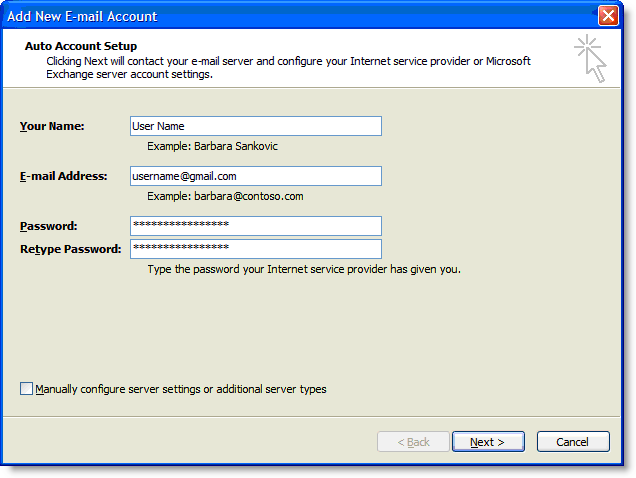
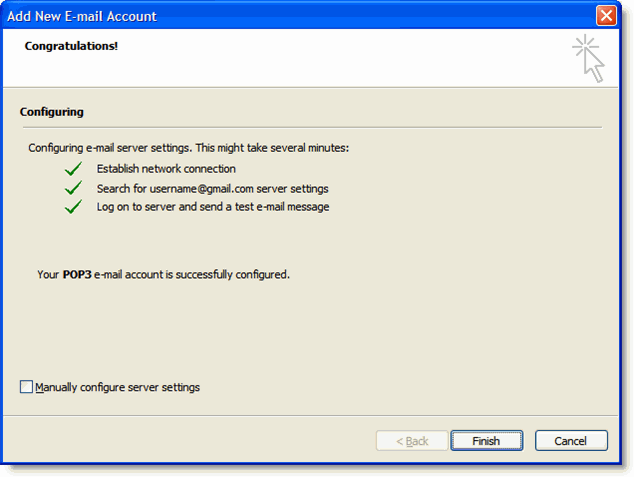
Account Type: POP3
Incoming mail server: pop.gmail.com (Google Apps users, enter the server names provided, don't add your domain name in these steps)
Outgoing mail server (SMTP): smtp.gmail.com
Logon Information
User Name: Enter your Gmail username (including @gmail.com). Google Apps users, enter your full address in the format username@your_domain.com
Password: Enter your email password.
Require logon using Secure Password Authentication (SPA): Leave this option unchecked.
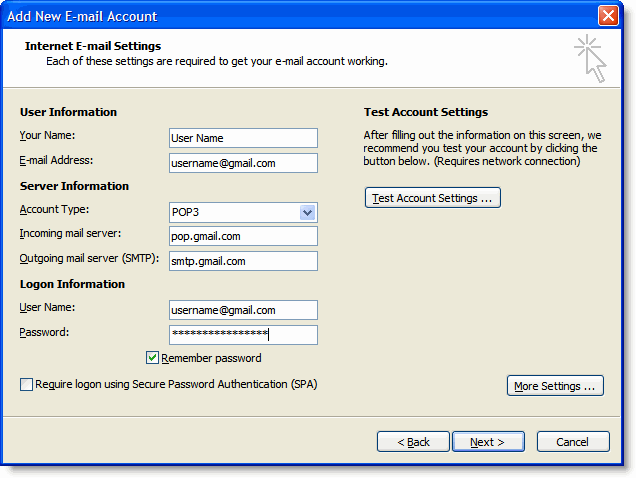
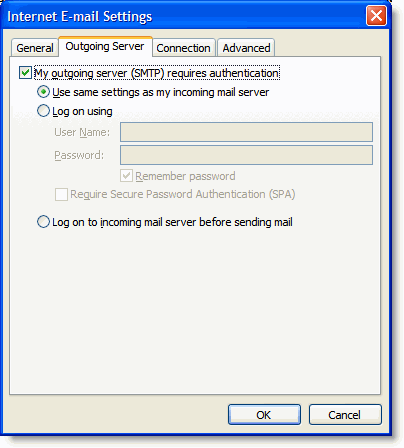
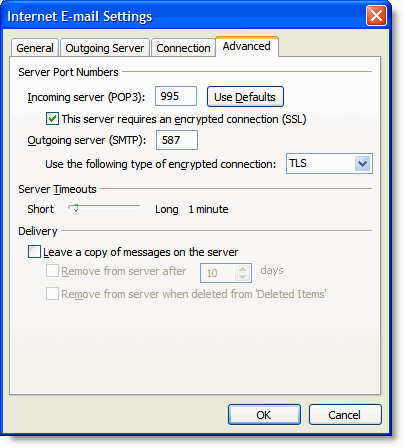
Congratulations! You're done configuring your client to send and retrieve Gmail messages.
Thursday, May 2, 2013
regsvr32.exe
In computing,
regsvr32 (Microsoft Register Server) is a command-line utility in Microsoft Windows operating systems for registering and unregistering DLLs and ActiveX controls in the Windows Registry.
To be used with regsvr32, a DLL must export the functions
DllRegisterServer and DllUnregisterServer.regsvr32 shmedia.dll for registering a fileregsvr32 /u shmedia.dll for unregistering a file
If another copy of shmedia.dll exists in the system search path, regsvr32 may choose that copy instead of the one in the current directory. This problem can usually be solved by specifying a full path (e.g., c:\windows\system32\shmedia.dll) or using the following syntax:
regsvr32 .\shmedia.dll
Thursday, April 18, 2013
"Send To" menu context in Windows
Windows | Run | shell:sendto
HKEY_CURRENT_USER \ Software \ Microsoft \ Windows \ CurrentVersion \ Policies \ Explore
- Create a new DWORD (32-bit) value named NoDrivesInSendToMenu
- Double-click NoDrivesInSendToMenu and set its value data to 1
HKEY_CLASSES_ROOT\AllFilesystemObjects\shellex\ContextMenuHandlers\Send To.
---> Just delete the ones you don't use.
Friday, April 12, 2013
28022013
28022013 Project: See https://28022013.codeplex.com/
Project Description
- Collect tips and tricks C/C++ programming languages
- Shell scripts i.e: Bash, C shell
- Testing Codeplex purpose only
git config --global user.name "altonjuve"
git config --global user.email "viet2105@outlook.com"
------ just for backup::: git clone https://git01.codeplex.com/28022013 CodePlex
git add cbf.bash
git commit -m "cbf.bash"
git add create_dir_for_iandv.sh
git commit -m "add create_dir_for_iandv.sh"
git add ffp.sh
git commit -m "add ffp.sh"
git add get_bin.sh
git commit -m "add get_bin.sh"
git add get_node_ipaddr.sh
git commit -m "add get_node_ipaddr.sh"
git add repac.sh
git commit -m "add repac.sh"
git add ccode.sh
git commit -m "my first commit to CodePlex"
git push origin master
Sunday, December 2, 2012
Thread safe programming
There are several ways in which a function can be thread safe.
It can be reentrant. This means that a function has no state, and does not touch any global or static variables, so it can be called from multiple threads simultaneously. The term comes from allowing one thread to enter the function while another thread is already inside it.
It can have a critical section. This term gets thrown around a lot, but frankly I prefer critical data. A critical section occurs any time your code touches data that is shared across multiple threads. So I prefer to put the focus on that critical data.
If you use a mutex properly, you can synchronize access to the critical data, properly protecting from thread unsafe modifications. Mutexes and Locks are very useful, but with great power comes great responsibility. You must not lock the same mutex twice within the same thread (that is a self-deadlock). You must be careful if you acquire more than one mutex, as it increases your risk for deadlock. You must consistently protect your data with mutexes.
If all of your functions are thread safe, and all of your shared data properly protected, your application should be thread safe.
As Crazy Eddie said, this is a huge subject. I recommend reading up on boost threads, and using them accordingly.
low-level caveat: compilers can reorder statements, which can break thread safety. With multiple cores, each core has its own cache, and you need to properly sync the caches to have thread safety. Also, even if the compiler doesn't reorder statements, the hardware might. So, full, guaranteed thread safety isn't actually possible today. You can get 99.99% of the way there though, and work is being done with compiler vendors and cpu makers to fix this lingering caveat.
Anyway, if you're looking for a checklist to make a class thread-safe:
- Identify any data that is shared across threads (if you miss it, you can't protect it)
- create a member
boost::mutex m_mutexand use it whenever you try to access that shared member data (ideally the shared data is private to the class, so you can be more certain that you're protecting it properly). - clean up globals. Globals are bad anyways, and good luck trying to do anything thread-safe with globals.
- Beware the
statickeyword. It's actually not thread safe. So if you're trying to do a singleton, it won't work right. - Beware the Double-Checked Lock Paradigm. Most people who use it get it wrong in some subtle ways, and it's prone to breakage by the low-level caveat.
That's an incomplete checklist. I'll add more if I think of it, but hopefully it's enough to get you started.
source: http://stackoverflow.com/questions/5125241/how-to-make-an-application-thread-safe
http://en.wikipedia.org/wiki/Thread_safety
Thread safety is a computer programming concept applicable in the context of multi-threaded programs. A piece of code is thread-safe if it only manipulates shared data structures in a manner that guarantees safe execution by multiple threads at the same time. There are various strategies for making thread-safe data structures.[1][2]
A key challenge in multi-threaded programming, thread safety was not a concern for most application developers until the 1990s when operating systems began to expose multiple threads for code execution. Today, a program may execute code on several threads simultaneously in a sharedaddress space where each of those threads has access to virtually all of the memory of every other thread. Thread safety is a property that allows code to run in multi-threaded environments by re-establishing some of the correspondences between the actual flow of control and the text of the program, by means of synchronization.
Levels of thread safety
Software libraries can provide certain thread-safety guarantees. For example, concurrent reads might be guaranteed to be thread-safe, but concurrent writes might not be. Whether or not a program using such a library is thread-safe depends on whether it uses the library in a manner consistent with those guarantees.
- Thread safe: Implementation is guaranteed to be free of race conditions when accessed by multiple threads simultaneously.
- Conditionally safe: Different threads can access different objects simultaneously, and access to shared data is protected from race conditions.
- Not thread safe: Code should not be accessed simultaneously by different threads.
Thread safety guarantees usually also include design steps to prevent or limit the risk of different forms of deadlocks, as well as optimizations to maximize concurrent performance. However, deadlock-free guarantees can not always be given, since deadlocks can be caused by callbacks and violation of architectural layering independent of the library itself.
[edit]Implementation approaches
There are a several approaches for avoiding race conditions to achieve thread safety. The first class of approaches focuses on avoiding shared state, and includes:
- Re-entrancy
- Writing code in such a way that it can be partially executed by a thread, reexecuted by the same thread or simultaneously executed by another thread and still correctly complete the original execution. This requires the saving of state information in variables local to each execution, usually on a stack, instead of in static or global variables or other non-local state. All non-local state must be accessed through atomic operations and the data-structures must also be reentrant.
- Thread-local storage
- Variables are localized so that each thread has its own private copy. These variables retain their values across subroutine and other code boundaries, and are thread-safe since they are local to each thread, even though the code which accesses them might be executed simultaneously by another thread.
The second class of approaches are synchronization-related, and are used in situations where shared state cannot be avoided:
- Mutual exclusion
- Access to shared data is serialized using mechanisms that ensure only one thread reads or writes to the shared data at any time. Incorporation of mutal exclusion needs to be well thought out, since improper usage can lead to side-effects like deadlocks, livelocks and resource starvation.
- Atomic operations
- Shared data are accessed by using atomic operations which cannot be interrupted by other threads. This usually requires using special machine language instructions, which might be available in a runtime library. Since the operations are atomic, the shared data are always kept in a valid state, no matter how other threads access it. Atomic operations form the basis of many thread locking mechanisms, and are used to implement mutual exclusion primitives.
- Immutable objects
- The state of an object cannot be changed after construction. This implies that only read-only data is shared and inherent thread safety. Mutable (non-const) operations can then be implemented in such a way that they create new objects instead of modifying existing ones. This approach is used by the string implementations in Java, C# and python.[7]
[edit]Examples
In the following piece of C code, the function is thread-safe, but not reentrant:
#includeint increment_counter () { static int counter = 0; static pthread_mutex_t mutex = PTHREAD_MUTEX_INITIALIZER; pthread_mutex_lock(&mutex); // only allow one thread to increment at a time ++counter; // store value before any other threads increment it further int result = counter; pthread_mutex_unlock(&mutex); return result; }
In the above,
increment_counter can be called by different threads without any problem since a mutex is used to synchronize all access to the shared counter variable. But if the function is used in a reentrant interrupt handler and a second interrupt arises inside the function, the second routine will hang forever. As interrupt servicing can disable other interrupts, the whole system could suffer.
The same function can be implemented to be both thread-safe and reentrant using the lock-free atomics in C++11:
#includeint increment_counter () { static std::atomic<int> counter(0); // increment is guaranteed to be done atomically int result = ++counter; return result; }
Wednesday, November 28, 2012
CXXFLAGS and CFLAGS
723 ifneq ($(HW), 21255)
724 ifeq ($(HW), 21240)
725 CFLAGS_64 += -D__USE_STD_IOSTREAM
726 CFLAGS_64 += -D_REENTRANT
727 CFLAGS_64 += -wd47
728 CFLAGS_64 += -wd69
729 CFLAGS_64 += -wd174
730 CFLAGS_64 += -wd271
731 CFLAGS_64 += -wd1572
732 endif
733 ifeq ($(HW), 21250)
734 CFLAGS_64 += -wd47
735 CFLAGS_64 += -wd101
736 CFLAGS_64 += -wd174
737 CFLAGS_64 += -wd271
738 CFLAGS_64 += -wd1572
739 endif
740 CFLAGS_64 += -wd68
741 CFLAGS_64 += -wd167
742 CFLAGS_64 += -wd181
743 CFLAGS_64 += -wd556
744 ifeq ($(HW), 21240)
745 CXXFLAGS_64 += -wd82
746 CXXFLAGS_64 += -wd69
747 CXXFLAGS_64 += -wd271
748 CXXFLAGS_64 += -wd181
749 endif
750 ifeq ($(HW), 21250)
751 CXXFLAGS_64 += -wd82
752 CXXFLAGS_64 += -wd69
753 endif
754 CXXFLAGS_64 += -wd68
755 CXXFLAGS_64 += -wd181
756 CXXFLAGS_64 += -wd411
757 else
758 CFLAGS_64 += -Wno-unused
759 CFLAGS_64 += -Wno-implicit
760 CFLAGS_64 += -Wno-redundant-decls
761 CFLAGS_64 += -Wno-sign-compare
762 CFLAGS_64 += -Wno-format-extra-args
763 CFLAGS_64 += -Wno-format
764 CFLAGS_64 += -Wno-uninitialized
765 CFLAGS_64 += -Wno-missing-field-initializers
766 CFLAGS_64 += -Wno-conversion
767 endif
Saturday, November 24, 2012
Mac OS X TIGER 10.4 Users (Darwin) Apps v
Antivirus:
ClamXAV v.2.2.1
Safari:
Safari v.4.1.3
Installer:
MacPorts 2.1.2
Programming:
Xcode: v.2.5
GNU cflow v.1.0
Exuberant Ctags 5.8
cscope: version 15.8a
powerpc-apple-darwin8-gcc-4.0.1 (GCC) 4.0.1
powerpc-apple-darwin8-g++-4.0.1 (GCC) 4.0.1
Splint 3.1.2 --- 24 Nov 2012
Friday, November 23, 2012
Redirect all output in shell script to a file
REF: http://www.thetechrepo.com/main-articles/532
( echo "this is line 1 of my script" cat /proc/cpuinfo dmesg echo "this is the end of my script" ) 2>> /tmp/filename.log
typeset log_fl=`basename $0`_` date +'%H%M%S'`.log
# sending this script output to the log file
exec 1>${log_fl}
Subscribe to:
Comments (Atom)
Labels
- _ASSERTE (1)
- _CRT_ASSERT (1)
- _CRT_ERROR (1)
- _CRT_WARN (1)
- _RPT0 (1)
- _RPT2 (1)
- _RPTF2 (1)
- -1073741515 (1)
- .vimrc (3)
- \160 (1)
- 00 (1)
- 0unzip (1)
- 10.4 (1)
- 1073741515 (1)
- 10minutemail (1)
- 28022013 (1)
- 5giay (1)
- ABI (1)
- absolute (1)
- Airlines (1)
- alias (2)
- Apple (3)
- Arch Linux (1)
- arduino (1)
- assignment (2)
- Australia (1)
- auto (1)
- Avoid (1)
- AvoidDirectlyAccessGlobals (1)
- AXE central processors (1)
- AXE system (1)
- bash (6)
- Bash script (3)
- bashrc (2)
- BIG_ENDIAN (1)
- bit-fields (1)
- blogspot (1)
- break down (1)
- buffer overflows (1)
- bug tracking (1)
- build (1)
- Built-in Shell Variables (1)
- C library (1)
- C programming (1)
- c shell (2)
- C++ (1)
- C++ Programming (1)
- C++Test (2)
- case (1)
- cast (1)
- cc (1)
- CDRWIN (1)
- CFLAGS (1)
- change management (1)
- check (1)
- check float values equality (1)
- checker (1)
- CHECKSUM (1)
- chrome (1)
- cl.exe (1)
- clearcase (1)
- Clearcase commands (1)
- cleartool (2)
- Clock (1)
- CloneCD (1)
- cloud (2)
- cmd (1)
- co.cc (1)
- CodePlex (1)
- Coding (1)
- Coding standard (1)
- Coding Standards (1)
- color (1)
- colour (1)
- Command Line (1)
- Command-Line (1)
- Command-Line editing (1)
- Command-Line editing mode (1)
- CommandLine (1)
- compilation (1)
- compile (1)
- compiler (2)
- compliance (1)
- compliance checker (1)
- constructor (1)
- Copy (2)
- cpp programming (1)
- CreateFile (2)
- creator (1)
- critical systems (2)
- cscope (3)
- csh (1)
- ctags (1)
- customer service (1)
- CXXFLAGS (1)
- dangerous functions (1)
- DCB sructure (1)
- Debian (1)
- debug (2)
- DEK Technologies (1)
- Delete (1)
- detected (1)
- Dev-cpp (1)
- developers (1)
- device (1)
- device driver (1)
- DeviceIoControl (1)
- diagram (1)
- diff (1)
- Directly (1)
- disposable (1)
- disposable e-mail addresses (1)
- divide and conquer. (1)
- dns (2)
- domainname (1)
- downgrade (1)
- drawback (1)
- dropbox (1)
- e-mail addresses (1)
- eclipse (1)
- Edit (1)
- End (1)
- environment (1)
- epsilon (1)
- Ericsson (4)
- ERLANG (2)
- errno (1)
- Error (2)
- error code (1)
- error result (1)
- example (1)
- Excel (1)
- exec (1)
- execute (1)
- execution time (1)
- exit code (1)
- explicit calculation of pointer (1)
- explorer (1)
- facebook (3)
- fansipan (1)
- fb (1)
- Fedora (1)
- fgets (1)
- Firefox (1)
- Firefox shortcuts (1)
- float (1)
- float equality (1)
- floating point (1)
- folding (1)
- forwarding (1)
- free (1)
- FreeCommander (1)
- from cl (1)
- function (1)
- Functions (3)
- FunctionsCallOrder (1)
- gitdiff (1)
- global data (1)
- gmail (1)
- GNU (5)
- google (1)
- GreatNews (1)
- Ground (1)
- Guerrilla Mail (1)
- Guidelines (1)
- Headquarters (1)
- help desk ticketing (1)
- high-level (1)
- holiday (1)
- Home (1)
- host (1)
- hostname (2)
- hosts (2)
- howto (1)
- iCloud (1)
- ide (1)
- illegal (1)
- implementation code (1)
- indexing (1)
- inet_pton (1)
- interface header (1)
- ioctl() (1)
- iPhone (1)
- iPhoneVietnam (1)
- java (1)
- jetstar (1)
- Job Ad (1)
- Karaoke (1)
- Korn shell (1)
- labelname (1)
- layers (1)
- Legibility (1)
- less confusing (1)
- linux (2)
- LITTLE_ENDIAN (1)
- login (1)
- lsocket (1)
- Lunar new yeat (1)
- Mac (1)
- Mac OS (1)
- Mac OS shortcuts (1)
- mailinator (1)
- maintainability (2)
- make (2)
- make clean (2)
- Makefile (2)
- Mandriva (1)
- Melbourne (1)
- memory (2)
- Microsoft (1)
- Mint (1)
- mintemail (1)
- misra (3)
- MISRA-C (1)
- MISRA-C 2004 (1)
- misra2004 (1)
- Mobifone (1)
- MobileMe (1)
- Modular (1)
- Modular programming (1)
- modules (1)
- more readable (1)
- Multi-Targeting (1)
- nbtscan (1)
- nbtstat (1)
- nested (1)
- network (1)
- network operations (1)
- nm. objdump (1)
- NoMachine (1)
- notepad++ (1)
- OFFLOAD (1)
- open() (1)
- OpenNx (1)
- OpenSSH (1)
- OpenStack (1)
- openSUSE (2)
- Orcas (1)
- outlook (1)
- outlook 2007 (1)
- parasoft (7)
- parts (1)
- password (1)
- Paste (1)
- patterns (1)
- PCLinuxOS (1)
- PCmover (1)
- perl (2)
- pkgmgr (1)
- PLEX (2)
- PLEX-C (1)
- pointer (2)
- pointer alignment (1)
- Pointer arithmetic (1)
- pop (1)
- Precompile (1)
- print16() (1)
- print32() (1)
- printHex() (1)
- programming (4)
- Programming Language for EXchanges (1)
- prompt (1)
- protocol (1)
- Puppy Linux (1)
- push (1)
- putty (2)
- re-use (1)
- read() (1)
- readelf (1)
- ReadFile (1)
- real-time (1)
- regsvr32 (1)
- request tracker (1)
- Reset Windows password (1)
- risky (1)
- rule (1)
- Sabayon Gentoo Live CD (1)
- safe (1)
- safety code (1)
- SBG HW environment (1)
- Screen (1)
- script (2)
- secure (1)
- Security (1)
- Send To (1)
- Send To menu (1)
- SendTo (1)
- serial number (1)
- serial port (1)
- Serial programming (2)
- services (1)
- sethc.exe (1)
- setup (1)
- setview (2)
- shared mem (1)
- shell (3)
- shell:sendto (1)
- side effects (1)
- site feed (1)
- skew (1)
- Slackware (1)
- snprintf (1)
- socket (1)
- source (1)
- ssh (2)
- status (1)
- strace (1)
- stray (1)
- string (2)
- strncat (1)
- strncpy (1)
- struct (1)
- SunOS (1)
- SWAP16/32 (1)
- switch (1)
- symbol (2)
- system (1)
- system() cmd (1)
- Tab (1)
- taglist (1)
- TC shell (1)
- TCP (1)
- tcpdump (1)
- technique (1)
- Telnet Client (1)
- tenmien (1)
- test (1)
- Testing (1)
- Tet (1)
- Thread safe (1)
- Thread safe programming (1)
- thread safety (1)
- Thunderbird (2)
- Tiger (1)
- tip (1)
- Tips (1)
- trick (1)
- tutorial (1)
- typedef (1)
- Ubuntu (1)
- UCdetector (1)
- uninitialized (1)
- union (1)
- unix (3)
- Unix access (1)
- unsafe (2)
- unsafe string (1)
- unzip (1)
- update (1)
- upgrade (1)
- useful tools (2)
- Variable Substitution (1)
- variables (1)
- vav (3)
- vav.vn (2)
- version (1)
- vi (2)
- Vietnam airlines (1)
- Viettel (1)
- vim (4)
- vimdiff (1)
- viminfo (1)
- Vinaphone (1)
- Violation (2)
- Vista (2)
- visual studio (1)
- vnnic (1)
- void (1)
- vs2005 (1)
- vs2008 (1)
- vspc (1)
- warranty (1)
- web (1)
- website (2)
- website test (1)
- Win8 (1)
- Windows (2)
- Windows 8.1 (1)
- winsxs (1)
- winsxslite (1)
- WinXP (1)
- workflow processes (1)
- write() (1)
- WriteFile (1)
- X (1)
- x11 (1)
- x64 (1)
- Xming (1)
- youth counselling (1)
- youtube (1)
- zebrazone (1)
- zebrazoo (1)
- zim (1)